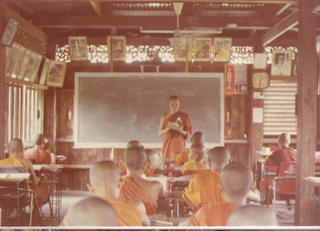

The Middle-Way
The religion that is being introduced here is a practical educational system for mental culture which was revealed to the world some twenty five centuries ago by a Fully Enlightened and Compassionate Teacher. This religion is also known as the "Middle-Way, a righteous way of life, an ethico-philosophical system and a religion of freedom and reason." It teaches us to do three main things; namely, "Keep away from bad deeds, do good and purify the mind."
This message is very simple, meaningful and practical, yet people experience difficulties when they put them into practice due to inherent human weakness. The moral conduct of man plays a most important part in this religion. Its great Teacher once said, "My teaching is not to come and believe, but to come, see and practise." It encourages people to study the teachings fully and so allow them to use their own judgement to decide as to whether they should accept the teachings or otherwise. No one is asked to come and embrace this religion without first having an understanding of its teachings.
Superfluous rites and rituals have no real religious value or significance. There are no superstitious beliefs and practices or secret doctrines in this religion. Everything is open to the choice of followers who are at liberty to investigate the teachings and ask questions whenever they wish to clear their doubts. According to the founder of this religion, one should not believe anything merely because a great sage has introduced it or because it is traditionally accepted by many but one should use one's common sense and intelligence and accept it only if it is worth while to do so.
This religion teaches the Noble Eight Fold Path which consists of Right Understanding, Right Thought, Right Speech, Right Action, Right Livelihood, Right Effort, Right Mindfulness and Right Concentration.. This unique middle way allows others to lead a noble and peaceful life.
The middle way is neither a metaphysical path nor a ritualistic path; neither dogmatism nor scepticism; neither self-indulgence nor self-mortification; neither eternalism nor nihilism; neither pessimism nor optimism; it is a Path of Enlightenment, a means of deliverance from suffering. This religion does not agree that human beings are suffering today because of the sins committed by their ancestors; on the contrary every person carries his or her merits or demerits individually. Man himself is solely responsible for his own pain or pleasure.
One who follows the middle path of moderation should find real peace and happiness and should be able to lead a respectable life without being a slave to one's senses, thus contributing to the peace and harmony of the world.







